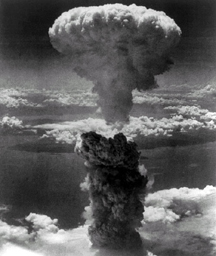
World Trade Center, completed 1970-1972, destroyed September 11, 2003
| This is a work in progress: lots of writing, formatting, revising, proofing left to do! — David McMurrey |
Note: With all due respect for the victims of the disasters shown here, the images in this chapter are meant as a meditation on the dark side of technology.

The noun stack is a sentence-style problem that plagues scientific and technical writing in particular. Science and technology move forward so rapidly, language can't keep up. A noun stack is a phrase in which the writer has jammed together multiple nouns, for example:
Noun stack: corporation-conference consultation telephony
Now you certainly recognize that this phrase is a big pompous blowhard standing in the place of telephone conference (don’t you?). Writers create and use noun stacks for a number of likely reasons:
Take a closer look at the noun stack. First, make sure you know what a noun is. Remember the noun? Yes, it's that word that names a person, place, or thing. As it is used within the sentence, you can put a, an, or the in front of it or make it plural. More information on nouns is available in the resources at the end of this chapter.
Noun stack: A phrase in which three or more modifying nouns have been jammed in front of another noun, creating comprehension problems for readers.A noun phrase is the noun but also all the stuff that modifies it. Remember the concept of modification? For example, in the noun phrase "red Miata with wire wheels," the word "red" modifies "Miata," and so does the preposition phrase "with wire wheels." All five words work together as a noun phrase.
A noun stack is a type of noun phrase—one that has overdone it. Consider this example of a noun stack:
Noun stack: strategic application development productivity

For the finicky grammarian, the words application and development are not nouns: they are adjectives because they modify productivity. But they sure look like nouns, don't they? Sometimes, noun stacks contain other words that are clearly not nouns; however, it's the overall effect of multiple nouns jammed together—or "stacked" on top of each other—that creates the mind-numbing effect associated with the noun stack. Here are a few more examples:
Noun stack:
customer skills transfer session
macro virus population diversity
In the first example, customer, skills, and transfer aren't nouns either: they are all adjectives—they modify session. In the second example, the words macro, virus, and population are not functioning as nouns: they are all adjectives modifying diversity. Still, they certainly look and read like nouns!
Now that we've been complaining about the noun stack so much, what's the problem with it (if it's not already obvious)?

If you read the preceding, you ought to be able to recognize noun stacks. Indeed, they do jump out at you once you have a name for them. But how do you fix them?
As the preceding diagram shows, often you can begin by taking the last word and one of the other stacked nouns to create a simple phrase and then rephrase the rest of the words as prepositional phrases, adjective clauses, or other "roomier" wording.
As you can see, noun-stack problems are close cousins to pompous-diction problems: big multisyllable words that sound important and are much longer than small simple plain humble words that mean the same thing. (See the chapter on pompous word choice.) Here's another example:
| Noun stack | Macro virus population diversity had gone from 1 to over 800 between 1999 to 2001. |
| Revision 1 | The diversity of the macro virus population had gone from 1 to over 800 between 1999 to 2001. |
| Revision 2 | The diversity of macro viruses had gone from 1 to over 800 between 1999 to 2001. |
| Revision 3 | Types of macro viruses increased from 1 to over 800 between 1999 to 2001. |

In this sequence of revisions, you can see that in the first revision sequence is pulled out of the noun stack Macro virus population diversity and brought to the beginning of the sentence. In the second revision, population is deleted: it adds no meaning here. In the third revision, diversity is replaced with Types of, the latter being more immediately understandable. And finally, the verb had gone is replaced with the more direct and active increased.
| Noun stack | In 1997, the U.S. Environmental Protection Agency (EPA) announced new national ambient ground-level ozone air-quality standards. |
| Revision 1 | In 1997, the U.S. Environmental Protection Agency (EPA) announced new standards for national ambient ground-level ozone air quality. |
| Revision 2 | In 1997, the U.S. Environmental Protection Agency (EPA) announced new standards for ambient ozone. |
Watch carefully what happens in each of the revisions. First, standards is chosen as the way to start unstacking this bureaucratic behemoth; it is combined with new, and the rest of the noun stack is dumped into a prepositional phrase. It's still too stacked up though! The next step is to weed out obvious words: the EPA operates nationally, so need for the word national. If you ask an environmental engineer, you'll discover ground-level and ambient mean different things; ambient is the precise term here. And air quality is just useless verbiage—if not a downright oxymoron in the twenty-first century.
As you can see, in just about any verbal situation, you have several options: you can express an idea in a word, in one of several types of phrases, and even in one of several types of clauses. See the chapter on word, phrase, clause choices for more on this idea. The main idea, however, is that you can compress an idea into a single noun, give it more room in a prepositional phrase, or give it lots more room in an adjective clause. Or, you can take an even more powerful approach and fit your idea into a noun clause.

Explore a few more examples of noun stacks and strategies for unstacking them:
Noun stack: Combustion chamber exit gas temperatures are approximately 2400ºF.
This is easy: drag temperatures or gas temperatures forward to the beginning of the sentence; turn the nominalization exit into the verbal exiting.
Revision: Gas temperatures exiting the combustion chamber are approximately 2400ºF.
Noun stack: Install a hazardous materials dispersion monitor system.
Once again, the trick of dragging the final noun of the noun stack to the beginning of the sentence works. Also, you can turn the nominalization monitor into the verbal monitoring.
Revision 1: Install a system for monitoring hazardous materials dispersion.
And when you look at the result, you probably wonder what can be done about dispersion. Obviously, you can rework the sentence to create a prepositional phrase of hazardous materials, as is done in the second revision. However, dispersal is a clunky word. How about something more dramatic like escape? Let's ask the engineers.
Revision 2: Install a system for monitoring the dispersal of hazardous materials.
Noun stack: Your job will involve fault analysis systems troubleshooting handbook preparation.
In this case, the final word of the noun stack looks like a nominalization; try to work it into the verb phrase. Is there a difference between fault analysis and troubleshooting. Maybe so, but let's live on the wild side and say there isn't. And finally, systems is just a dumb useless word here—toss it outta there.
Revision: Your job will be to prepare a troubleshooting handbook.
Noun stack: Remember to leave enough time for a training session participant evaluation.
Okay, we want to evaluate something—something related to the training session. Evaluate the participants? Or allow the participants to evaluate the training session? Hard to say: this is a good example of how noun stacks can create ambiguity.
Revision A: Remember to leave enough time for participants to evaluate the training session.
Notice in both these revisions the nominalization evaluation is turned ito the verb evaluate.
Revision B: Remember to leave enough time to evaluate the participants of the training session.
Noun stack: The consultant recommends management performance improvement incentives.
Hmm, somebody needs to improve their performance! Looks like that someone is management. Looks like incentives are needed to make that happen. As usual, drag the last word of the noun stack to the beginning of, in this case, this phrase. Look for a nominalization that can wake this sentence up.
Revision: The consultant recommends incentives to improve management performance.
Now, try your hand at unstacking noun stacks:

As you’ve probably noticed in the preceding, noun stacks often make use of current buzzwords. Words like skills transfer, reengineering, state of the art, and cutting edge all have their day and are used unthinkingly for effect. Academia and industry often enjoy creating fancy multi-word phrases for simple objects. Take a look at the following and see if you can guess what the simple object, process, or action is:
Noun-stack version: wax luminscence apparatus
Okay, let's figure this out. It's a thing made out of wax and gives off lumiscence (as in light). What is that?
Simplified version: candle
Noun-stack version: brain-based randomized ideation process
Okay, it's activity that occurs in the brain and functions to create random ideation (as in ideas). And the answer is . . .
Simplified version: brainstorming
Noun-stack version: liquid beverage concavity
A concavity is a concave-shaped thing. This particular one is for beverages (are there any type of beverage other than liquid?); it holds them. Sounds like a . . .
Simplified version: bottle, bowl
Noun-stack version: human-based print interpretation process
Humans do it. It's an activity which they interpret printed stuff. Hmmmm, that must be . . .
Simplified version: reading
Noun-stack version: fermented-beverage soft-wood extraction system
Okay, it's made out of soft wood. It involves extacting and fermented beverages. Could that possibly be a . . .
Simplified version: corkscrew
Noun-stack version: Day-time nonoccupational leisure-enabled somnolence
Somnolence refers either to sleep or sleepiness. This particular form seems to occur during the day at non-occupational, leisure moments. What could that mean? Apparently, this thing occurs while a person is not at work, but instead during leisure time. Aha, that's what I need.
Simplified version: nap
How about living on the dark side and trying your hand at creating noun stacks for simple words:

Links to these exercises are provided at the end of the sections where they are relevant. But here they all are in case you read the text straight through:
Return to the table of contents
Information and programs provided by admin@mcmassociates.io.